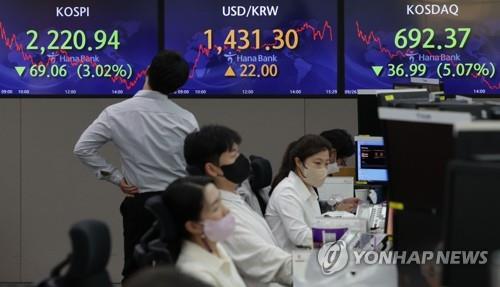- California Assembly OKs highest minimum wage in nation
- S. Korea unveils first graphic cigarette warnings
- US joins with South Korea, Japan in bid to deter North Korea
- LPGA golfer Chun In-gee finally back in action
- S. Korea won’t be top seed in final World Cup qualification round
- US men’s soccer misses 2nd straight Olympics
- US back on track in qualifying with 4-0 win over Guatemala
- High-intensity workout injuries spawn cottage industry
- CDC expands range of Zika mosquitoes into parts of Northeast
- Who knew? ‘The Walking Dead’ is helping families connect
Seoul stocks, Korean won in tailspin amid growing recession fears
Seoul stocks dropped to the lowest level in over two years and the Korean won also continued to tumble Monday amid growing fears of a global economic recession caused by combative monetary tightening in major economies.
The benchmark Korea Composite Stock Price Index (KOSPI) fell by 69.06 points, or 3.02 percent, to end at 2,220.94, the lowest since July 27, 2020. The market slid for a fourth consecutive session.
Trading volume was moderate at 611.4 million shares worth 9.18 trillion won (US$6.4 billion), with decliners far outnumbering gainers 891 to 34.
Foreign investors bought a net 280 billion won worth of shares, while institutional individual investors sold off a net 251.5 billion won.
The local stock market opened sharply lower tracking a decline on Wall Street on Friday, as investors fled for safety and cashing out of the stock market on fears that aggressive rate hikes by the Federal Reserve and other central banks could seriously hurt the global economy.
The S&P500 fell 1.7 percent, the Dow Jones Industrial Average dropped 1.6 percent, and the tech-heavy Nasdaq Composite sank 1.8 percent.
Last week, the Fed raised its benchmark interest rates by three-quarters of a point, its third increase in a row to bring down inflation.

Screens show the benchmark KOSPI stock index, the won-dollar exchange rate and the tech-rich KOSDAQ at a Hana Bank branch in central Seoul on Sept. 26, 2022. (Yonhap)
“As there is a high possibility of the Fed raising its policy rate until the first quarter of next year, the world economy is feared to fall into a recession,” Lee Kyung-min, an analyst at Daishin Securities, said.
“I think the KOSPI could fall as low as the 2,050 level, considering revised forecasts for corporate earnings amid the economy’s possible hard landing.”
In Seoul, large-cap shares closed down across the board.
Market bellwether Samsung Electronics lost 1.1 percent to close at a 52-week low of 53,900 won and SK hynix, the world’s second-largest memory chip maker, shed 1.2 percent to 82,500 won.
Top automaker Hyundai Motor dipped 4.2 percent to 182,500 won, while battery maker LG Energy Solutions slid 3.04 percent to 446,500 won. Leading chemical firm LG Chem dropped 5.46 percent to 571,000 won.
Internet giant Naver lost 2.85 percent to 204,500 won and Kakao, the operator of the popular mobile messenger Kakao Talk, also shed 2.13 percent to 59,700 won.
Daewoo Shipbuilding & Marine Engineering spiked 13.4 percent to close at 24,950 won on reports that Hanwha Group is seeking to take over the country’s No. 2 shipbuilder in a deal valued at some 2 trillion won.
The local currency ended at 1,431.30 won against the U.S. dollar, sharply down 22 won from the previous session’s close and a level unseen in over 13 years. The won has depreciated around 17 percent per dollar so far this year.
Bond prices, which move inversely to yields, closed lower. The yield on three-year Treasurys rose 34.9 basis points to 4.548 percent and the return on the benchmark five-year government bonds gained 37 basis points to 4.563 percent.











